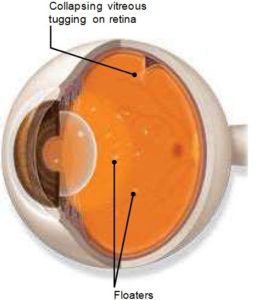What are floaters?
Floaters look like small specks, dots,circles, lines or cobwebs in your field of vision. While they seem to be in front of your eye, they are floating inside. Floaters are tiny clumps of gel or cells inside the vitreous that fills your eye. What you see are the shadows these clumps cast on your retina.
You usually notice floaters when looking at something plain, like a blank wall or a blue sky.
As we age, our vitreous starts to thicken or shrink. Sometimes clumps or strands form in the vitreous. If the vitreous pulls away from the back of the eye, it is called posterior vitreous detachment. Floaters usually happen with posterior vitreous detachment. They are not serious,and they tend to fade or go away over time. Severe floaters can be removed by surgery, but this has risks and is seldom necessary.
You are more likely to get floaters if you:
- are nearsighted (you need glasses to see far away)
- have had surgery for cataracts
- have had inflammation (swelling) inside the eye
What are flashes?
Flashes can look like flashing lights or lightning streaks in your field of vision. Some people compare them to seeing “stars” after being hit on the head. You might see flashes on and off for weeks, or even months. Flashes happen when the vitreous rubs or pulls on your retina.
As people age,it is common to see flashes occasionally.
Summary
Floaters are dark specks or dots in your field of vision. They are shadows you see from clumps of vitreous gel in your eye. Flashes are flashes of light that look like lightning streaks in your field of vision. Flashes occur when the vitreous gel rubs or pulls on your retina.
Floaters and flashes are quite common as people age. However, they can be signs of a retinal detachment, which is a serious problem. If you suddenly have a lot of floaters and see flashes, and you notice changes in your vision, call your ophthalmologist right away.
If you have any questions about your eyes or your vision,speak with your ophthalmologist. He or she is committed to protecting your sight.
Watch a floaters and flashes video from the American Academy of Ophthalmology’s EyeSmart program at aao.org/floaters-flashes-link

Eye Words to Know
Retina: Layer of cells lining the back wall inside the eye. This layer senses light and sends signals to the brain so you can see.
Vitreous: Clear, gel-like substance that fills the inside of your eye.
When floaters and flashes are serious
Most floaters and flashes are not a problem. However,there are times when they can be signs of a serious condition. Here is when you should call an ophthalmologist right away:
- you notice a lot of new floaters
- you have a lot of flashes
- a shadow appears in your peripheral (side) vision a gray curtain covers part of your vision
These floaters and flashes could be symptoms ofa torn or detached retina. This is when the retina pulls away from the back of your eye. This is a serious condition that needs to be treated.
Flashes and migraines
Sometimes people have light flashes that look like jagged lines or heat waves. These can appear in one or both eyes and may last up to 20 minutes. This type of flash may be caused by a migraine. A migraine is a spasm of blood vessels in the brain.
When you get a headache after these flashes, it is called a “migraine headache.” But sometimes you only see the light flash without having a headache. This is called an “ophthalmic migraine” or “migraine without headache.”
